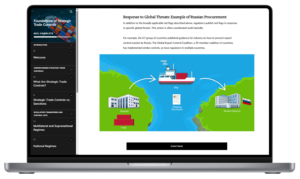Sanctions and Export Controls Update
Monthly Roundup – September 2025
📅 October 1, 2025
📅 October 1, 2025
Welcome to this month’s Sanctions and Export Controls Update, highlighting IFI’s take on key developments from September 2025.
The United Nations reimposed sanctions on Iran based on the continuing “significant non-performance” of its nuclear commitments, concluding the snapback process initiated in late-August by France, Germany and the United Kingdom. Meanwhile, the EU announced a fresh package of significant restrictive measures to ramp up pressure on Russia, and the U.S. continued to roll out additional sanctions against Iran and drug cartels. The U.S. also published a rule to address export control evasion, asserting that any entity that is at least 50% owned by one or more entities on the Entity List will itself be subject to restrictions.
Following the invoking of the snapback mechanism by France, Germany, and the United Kingdom (E3) who notified the United Nations Security Council (UNSC) on 28 August of Iran’s significant non-compliance of its commitments under the Joint Comprehensive Plan of Action (JCPoA), the UNSC on 28 September re-imposed all nuclear-related UN sanctions and restrictions against Iran that had been terminated under UNSC Resolution 2231 which endorsed the JCPoA.
The resolutions brought back into force the following mandates:
Iran: Statement by the High Representative on the reintroduction of nuclear sanctions and restrictions (September 28)
The EU High Representative for Foreign Affairs, who also serves as Coordinator of the JCPoA Joint Commission, announced that the EU will now proceed to implement the re-imposition of all previously lifted UN and EU nuclear-related sanctions without delay. The announcement also urged Iran “to fully resume cooperation with the International Atomic Energy Agency without delay, in line with its legal obligations under the Treaty on the Non-Proliferation of Nuclear Weapons.”
The European Commission proposed its 19th package of sanctions against Russia, which includes a plan to phase out Russian LNG purchases by the start of 2027, provisions to pressure companies from China and other countries to stop doing business with Russia, and the targeting of cryptocurrency platforms that enable transactions with Russia. In addition, the UK announced 100 new sanctions on Russia targeting oil revenues and military supply chains, and the EU imposed sanctions on two individuals over abuses in detention centers in Crimea.
Statement by President von der Leyen on the 19th package of sanctions against Russia (September 18)
The President of the European Commission announced the 19th package of sanctions against Russia. The package includes:
The latest package of sanctions will need to gain approval from political leaders across the 27-nation bloc, which is expected to happen in October.
UK Sanctions Actors Forcibly Deporting, Indoctrinating, and Militarizing Ukrainian Children (September 3)
The UK sanctioned eight individuals and three entities supporting Moscow’s attempts to forcibly deport, indoctrinate, and militarize Ukrainian children. According to the UK Foreign, Commonwealth & Development Office, intelligence demonstrates that Russia is pursuing a long-standing Russification policy in illegally temporarily occupied territories of Ukraine, seeking to eradicate Ukrainian culture, identify, and statehood. According to the UK, to date more than 19,500 Ukrainian children have been forcibly transferred or deported by the Russian authorities, and of these an estimated 6,000 have been relocated to a network of re-education camps.
EU Imposes Sanctions on Two Individuals Over Abuses in Detention Centers in Crimea (September 5)
The council adopted restrictive measures against Vadim Bulgakov and Aleksei Pikin under the EU’s global human rights sanctions regime. Bulgakov and Pikin are respectively the head and deputy head of the Directorate of the Russian Federal Penal Enforcement Service for the Republic of Crimea and the City of Sevastopol, and are responsible for detainees and prisoners, including political prisoners, in Crimea. Under their leadership, widespread and systematic human rights violations in Crimean detention centers have been documented by the United Nations and the European Court of Human Rights.
UK Ratchets Up Pressure on Putin’s Military Mahine (September 12)
The UK announced 100 new sanctions on Russia during British Foreign Secretary Yvette Cooper’s visit to Ukraine on September 12. The restrictive measures, targeting oil revenues and military supply chains, cover 70 vessels in Russia’s shadow fleet transporting oil, along with 30 entities and individuals providing electronics, chemicals, and explosives used in missiles and drones. Among those named are Shenzhen Blue Hat International Trade, its Russian co-owners Elena Malitckaia and Alexey Malitskiy, Turkey-based Mastel Makina Ithalat Ihracat Limited Sirketi, and its CEO, Shanlik Shukurov.
Ukraine Synchronizes Sanctions with UK Targeting Russia Military-Industrial Complex (September 10)
Ukrainian President Zelenskyy signed decrees synchronizing his country’s sanctions with those imposed by the United Kingdom on entities supporting Russia’s military-industrial complex, shadow fleet, and energy sector. The decrees applied restrictive measures against 47 individuals and 81 legal entities that supply electronics to Russia, extract coal in temporarily occupied territories, conduct repair work in mines, and operate the shadow fleet. Among them are Stroyservis, which is one Russia’s largest coal suppliers, and Russian Energy Group.
Other Sanctions and Export Control Developments
EU Updates Dual-Use Export Control List (September 8)
The European Commission adopted a Delegated Regulation updating the EU dual-use export control list in Annex 1 of Regulation (EU) 2021/821. The update brings the list in line with decisions taken in the multilateral export control regime’s Wassenaar Agreement (WA), Missile Technology Control Regime (MTCR), Australia Group (AG), and Nuclear Supplier Group (NSG) in 2024. New items include quantum technology, semiconductor manufacturing and testing equipment and materials, advanced computing integrated circuits, coatings for high temperature applications, additive manufacturing machines, and peptide synthesizers.
EU Extends Sudan Sanctions Regime by One Year (September 22)
The Council of the EU has extended its restrictive measures for one year against persons accused of destabilizing Sudan and blocking its political transition. The sanctions, now in place until October 10, 2026, target 10 individuals and eight entities with an EU-wide travel ban, asset freezes, and funding restrictions. The EU has progressively expanded sanctions since 2023 against groups tied to the Sudanese Armed Forces and Rapid Support Forces, which have waged a war that has devastated millions of civilians.
UK Publishes Sanctions Starter Guide (September 22)
The UK government published a starter guide on sanctions for organizations that need to understand more about what sanctions are and how they work. The guide includes detailed information on types of sanctions, sanctions lists and screening, ownership and control, exceptions and licensing, conducting due diligence, and circumvention.
The U.S. continued to target Mexican drug cartels and their supporters and associates, as well as overseas companies responsible for manufacturing and selling synthetic opioids and counterfeit fentanyl-laden pills to Americans. OFAC imposed sanctions against the Sinaloa cartel’s armed wing and a network of businesses operating near the U.S.-Mexico border, a China-based manufacturer of synthetic opioids, and an India-based online pharmacy supplying counterfeit prescription pills containing fentanyl and other illicit drugs to U.S. consumers. In addition, the State Department designated two Ecuador-based groups tied to the Sinaloa and Jalisco cartels as Foreign Terrorist Organizations (FTOs).
Treasury Sanctions Powerful Faction of the Terrorist Sinaloa Cartel (September 18)
OFAC imposed sanctions on the Los Mayos faction of the Sinaloa Cartel, its armed wing, and a network of associates and businesses operating near the U.S.-Mexico border. Los Mayos controls key drug routes in Baja California, trafficking fentanyl, cocaine, heroin, methamphetamine, and marijuana into the United States. The action targeted cartel figure Juan Jose Ponce Felix, known as “El Ruso,” who leads the group’s armed forces and is wanted under a $5 million U.S. Department of State reward. Treasury also designated five individuals and 15 businesses tied to Los Mayos, including companies in Rosarito, where the cartel allegedly launders drug proceeds and influences local government. The sanctions were coordinated with the U.S. Drug Enforcement Administration, the U.S. Federal Bureau of Investigation, and the U.S. Attorney’s Office in San Diego.
Treasury Sanctions China-Based Chemical Company to Combat Synthetic Opioid Trafficking (September 3)
OFAC designated Guangzhou Tengyue Chemical Co., Ltd.—a chemical company operating in China that is involved in the manufacture and sale of synthetic opioids to Americans—along with two of its representatives. OFAC carried out its investigation with the support of DEA and FBI, and FBI also announced a federal criminal indictment against the sanctions targets and others for conspiracy to commit drug trafficking.
Treasury Sanctions Indian Nationals and Online Pharmacy for Supplying Counterfeit Fentanyl-Laden Pills (September 24)
Treasury designated Indian nationals Sadiq Abbas Habib Sayyed and Khizar Mohammad Iqbal Shaikh for supplying counterfeit prescription pills containing fentanyl and other illicit drugs to U.S. consumers. KS International Traders, an India-based online pharmacy owned by Shaikh, was also designated. Sayyed and Shaikh are accused of conspiring with Dominican Republic- and U.S.-based narcotics traffickers to sell counterfeit pills to Americans, marketing the pills as legitimate products, and using encrypted platforms to sell them in the United States. Both were indicted in New York in 2024 on narcotics charges.
Terrorist Designations of Los Choneros and Los Lobos (September 4)
The State Department announced the designations of Ecuador-based groups Los Choneros and Los Lobos as Foreign Terrorist Organizations (FTOs) and Specially Designated Global Terrorists (SDGTs). Both groups have reportedly attacked and threatened public officials and their families, security personnel, judges, prosecutors, and journalists, and both groups are reportedly linked to Mexico-based FTO cartels Sinaloa and Jalisco. According to the State Department, their ultimate goal is to control drug trafficking routes through Ecuador by terrorizing and inflicting violence on the Ecuadorian people.
The U.S. continued to target Iranian oil smuggling and sanctions evasion networks, as well as proxy groups backed by Tehran. OFAC sanctioned a network of shipping companies and vessels that smuggle Iranian oil disguised as Iraqi oil, and over a dozen Hong Kong and UAE-based individuals and entities that coordinate funds transfers, including from the sale of Iranian oil, for designated Iranian government organizations. The Treasury and State Departments also sanctioned several Iranian proxy groups and affiliated support networks in Yemen, Sudan, and Iraq.
Treasury Intensifies Pressure on Iranian Oil Smuggling and Sanctions Evasion Schemes in Iraq (September 2)
OFAC sanctioned a network of shipping companies and vessels led by Iraqi-Kittitian businessman Waleed al-Samarra’i for smuggling Iranian oil disguised as Iraqi oil. The network—which includes two UAE-based companies, nine Liberia-flagged vessels, and five Marshall Island-based shell companies—operates primarily by covertly blending Iranian oil with Iraqi oil, which is then marketed intentionally as solely of Iraqi origin to avoid sanctions. The scheme as reportedly generated hundreds of millions of dollars in revenue for both the Iranian regime and al-Samarra’i himself.
Treasury Targets Financial Network Supporting Iran’s Military (September 16)
Treasury announced sanctions on Iranian nationals Alireza Derakhshan and Arash Estaki Alivand for facilitating the purchase of more than $100 million worth of cryptocurrency for the Iranian government’s oil sales. Sanctions were also imposed on over a dozen Hong Kong- and United Arab Emirates-based individuals and entities for coordinating funds transfers, including from the sale of Iranian oil, that benefit the Islamic Revolutionary Guard Corps-Qods Force (IGRC-QF) and Iran’s Ministry of Defense and Armed Forces Logistics (MODAFL). According to Treasury, Iranian “shadow banking” networks take advantage of the international financial system and evade sanctions by laundering money through overseas front companies and crypto, and the IRGC-QF and MODAFL use the proceeds to support terrorist proxy groups and develop advanced weapons systems.
Treasury Sanctions Huthi Illicit Revenue and Procurement Networks (September 11)
OFAC announced sanctions against 32 individuals and entities and four vessels, targeting the Houthis’ global illicit fundraising, smuggling, and weapons procurement operations. Those sanctioned include Houthi-associated companies, their owners, and other key operatives located in Yemen, China, the United Arab Emirates, and the Marshall Islands. They facilitate the acquisition of advanced military-grade materials, including ballistic missiles, cruise missiles, and unmanned aerial vehicle components, threatening U.S. and allied forces, according to Treasury.
Treasury Sanctions Sudanese Islamist Actors to Counter Support for Iran and Regional Instability (September 12)
OFAC imposed sanctions on Sudanese Finance Minister Gebreil Ibrahim Mohamed Fediel and the Al-Baraa Bin Malik Brigade (BBMB) for fueling Sudan’s civil war and maintaining ties with Iran. Gebreil, leader of the Justice and Equality Movement, is accused of sending thousands of fighters against the Rapid Support Forces and collaborating with Tehran. The Islamist militia BBMB, which originated as the paramilitary Popular Defense Forces, has deployed more than 20,000 fighters with Iranian support and committed abuses.
State Department Designates Four Iran-Aligned Militia Groups as FTOs (September 17)
State designated Harakat al-Nujaba (HAN), Kata’ib Sayyid al-Shuhada (KSS), Harakat Ansar Allah al-Awfiya (HAAA), and Kata’ib al-Imam Ali (KIA) as foreign terrorist organizations (FTOs). According to the State Department, HAN is a leading member of the Islamic Resistance in Iraq (IRI), a front group of Iraqi militias that are part of the broader Iran-aligned Axis of Resistance, and whose officials have publicly threatened U.S. military bases and personnel in the region. Meanwhile, KSS is a member of the IRI and has threatened both U.S. and Global Coalition to Defeat ISIS personnel in Iraq and Syria. HAAA was also involved in the IRI’s January 2024 drone attack in Jordan that killed three U.S. service members, while KIA has facilitated kinetic operations against U.S. forces in Iraq.
The U.S. also imposed sanctions on facilitators for the DPRK’s weapons program, a Southeast Asian network targeting Americans with cyber scams, and public officials in Montenegro, Brazil, and Haiti involved in significant corruption and human rights abuses. In addition, OFAC announced enforcement actions against a freight forwarder and a digital asset exchange for apparent violations of multiple sanctions programs.
Treasury Targets Arms Trafficking Network and Financial Facilitators for DPRK Weapons Programs (September 25)
OFAC designated five individuals and an entity for generating illicit revenue for North Korea’s weapons of mass destruction and ballistic missile programs. The designations target representatives of the Korea Mining Development Trading Corp. (KOMID) and the Reconnaissance General Bureau (RGB), both already sanctioned by OFAC and the United Nations. Those subject to the restrictive measures are Burmese firm Royal Shune Lei, accused of brokering weapons deals between KOMID and Myanmar’s military regime; Royal Shune Lei employee Kyaw Thu Myo Myint, CEO Tin Myo Aung, and Director Aung Ko Ko Oo; Kim Yong Ju, the deputy KOMID representative in China; and RGB intelligence officer Nam Chol Ung, who uses a network of businesses in Laos and Thailand to launder foreign currency earnings for North Korea.
Treasury Sanctions Southeast Asian Networks Targeting Americans with Cyber Scams (September 8)
OFAC imposed sanctions on a large network of scam centers across Southeast Asia that steal billions of dollars from Americans using forced labor and violence. The action included nine targets operating in Shwe Kokko, Burma, a notorious hub for virtual currency investment scams under the protection of the OFAC-designated Karen National Army (KNA), as well as ten targets based in Cambodia.
State Designates Two Montenegro Public Officials for Significant Corruption (September 10)
The State Department designated two former senior Montenegrin officials for significant corruption tied to organized crime and drug trafficking. Milo Bozovic, former mayor of Budva and member of parliament, is accused of abusing public office to facilitate international narcotics operations. Vesna Medenica, former president of Montenegro’s Supreme Court, allegedly supported a smuggling network by leaking judicial information, mediating court rulings, and taking bribes in exchange for cash and property. Both are now barred from entering the United States, along with their immediate family members, under the Department of State, Foreign Operations, and Related Programs Appropriations Act.
Treasury Sanctions Support Network of Brazilian Supreme Court Justice (September 22)
OFAC designated Lex Instituto de Estudos Juridicos LTDA (Lex Institute) and its head, Viviane Barci de Moraes, for providing material support to Brazilian Supreme Federal Court (STF) Justice Alexandre de Moraes. Justice Moraes, who is Viviane’s husband, was designated in July for authorizing arbitrary detentions, suppressing free expression in Brazil, and enabling politicized prosecutions, including the conviction of former President Jair Bolsonaro. The designation implements the Global Magnitsky Human Rights Accountability Act, which authorizes sanctions against perpetrators and facilitators of serious human rights abuses worldwide.
Designation of Two Former Haitian Public Officials for Involvement in Significant Corruption (September 22)
The State Department designated Arnel Belizaire, a former member of the Haitian Chamber of Deputies, and Antonio Cheramy, a former Haitian senator, for their involvement in significant corruption. According to the department, the two interfered with public processes of the Haitian government by abusing their positions, leading to the further destabilization of Haiti’s institutions and processes. The designation pursuant to Section 7031(c) of the Department of State, Foreign Operations, and Related Programs Appropriations Act, 2024 makes Belizaire, Cheramy, and their immediate family members ineligible for entry into the United States.
State Designates Barrio 18 as FTO and SDGT (September 23)
Secretary of State Marco Rubio announced the designation of Barrio 18 as both a foreign terrorist organization and a specially designated global terrorist. Rubio said that Barrio 18 is responsible for violent attacks against security forces, officials, and civilians in El Salvador, Guatemala, and Honduras. The group has also fueled illicit drug flows into the United States, generating revenue to sustain its criminal and terrorist activities. The action was taken under Section 219 of the Immigration and Nationality Act and Executive Order 13224.
Sanctioning Foreign NGOs Directly Engaged in ICC’s Illegitimate Targeting of Israel (September 4)
The Secretary of State designated three NGOs—Al Haq, Al Mezan Center for Human Rights, and the Palestinian Centre for Human Rights (PCHR)—for directly engaging in efforts by the International Criminal Court (ICC) to investigate, arrest, detain, or prosecute Israeli nationals without Israel’s consent.
Settlement Agreement Between OFAC and Fracht FWO Inc. (September 3)
OFAC announced that Fracht FWO Inc., a Houston-based freight forwarder, has agreed to pay $1,610,775 to settle apparent violations of multiple sanctions programs, including those on Venezuela and Iran. Fracht contracted with a blocked Government of Venezuela airline to transport goods from Mexico to Argentina. The blocked Venezuelan airline used an aircraft blocked by OFAC for being operated by Iran’s Mahan Air, which was sanctioned under U.S. terrorism and proliferation authorities. OFAC found Fracht’s conduct was egregious and not voluntarily self-disclosed.
Settlement Agreement Between OFAC and ShapeShift AG (September 22)
OFAC announced that ShapeShift, a defunct digital asset exchange incorporated in Switzerland and formerly based in Denver, Colorado, will pay $750,000 to settle apparent violations of multiple U.S. sanctions programs. Between 2016 and 2018, ShapeShift processed over 17,000 digital asset transactions worth $12.5 million for users in Cuba, Iran, Sudan, and Syria, without screening for sanctioned jurisdictions. OFAC said the company lacked a sanctions compliance program at the time and ignored available data, such as IP addresses that indicated user locations. While the violations carried a base penalty of nearly $40 million, OFAC reduced the settlement due to mitigating factors, including ShapeShift’s small size, cooperation with investigators, and the fact that it ceased operations in 2021.
The Commerce Department’s Bureau of Industry and Security (BIS) published an interim final rule (IFR) asserting that any entity that is at least 50% owned by one or more entities on the Entity List will itself be subject to Entity List restrictions. BIS also added 32 entities to the Entities List and eased restrictions on Belavia-Belarusian Airlines to permit the flights of certain aircraft, as well as their service, maintenance, and repair. The Justice Department indicted an Armenian man for exporting semiconductor-related items to Russia through Armenia without the necessary license from BIS.
Expansion of End-User Controls to Cover Affiliates of Certain Listed Entities (September 30)
BIS published an interim final rule (IFR), amending the Export Administration Regulations (EAR), to address diversion concerns involving entities on the Entity List and certain other restricted end users. Under the IFR, any entity that is at least 50% owned by one or more entities on the Entity List will itself be subject to Entity List restrictions. It similarly applies restrictions to entities at least 50% owned by listed “military end users” and certain sanctioned parties. The new 50% ownership standard is designed to be consistent with longstanding Department of the Treasury practice, so as to limit the additional burden on the business community.
Commerce BIS Adds 32 Companies to the Entities List (September 16)
BIS added 32 entities to the Entity List for acquiring U.S.-origin items in support of China’s military modernization and diverting U.S.-origin items to Russia, among other violations. Among those added to the list is Chinese Academy of Sciences, National Time Service Center for acquiring and attempting to acquire U.S.-origin items in support of advancing China’s military and defense-related space-domain activities, as well as China’s quantum technology capabilities.
U.S. Eases Restrictions on Belarusian Flag Carrier Belavia (September 12)
BIS issued a statement of licensing policy, coinciding with a new letter of authorization easing certain restrictions on Belavia-Belarusian Airlines. The authorization permits flights of specific Belavia aircraft between Belarus and most international destinations, as well as their service, maintenance, repair, overhaul, and refurbishing. Eight Belavia aircraft were simultaneously removed from the General Prohibition 10 list to enable such work. License applications for exports, reexports, or in-country transfers of equipment and materials connected to Belavia will now be reviewed on a case-by-case basis to ensure they are strictly for the airline’s commercial passenger fleet.
Armenian Man Indicted in Austin for Alleged Role in Conspiracy to Smuggle Goods to Russia (September 2)
According to court documents, from February 2022 until at least August 2024, Kamo Kirakosyan and others allegedly exported goods, including items that can be used for semiconductor manufacturing, from the United States to Russia through Armenia without the necessary license from BIS. Kirakosyan allegedly became the straw purchaser of U.S.-origin goods for his co-conspirators shortly after Russia’s full-scale invasion of Ukraine and the imposition of additional sanctions and export controls on Russia.

Our course Foundations of Strategic Trade Controls offers a comprehensive overview of how to understand and apply strategic trade control requirements, with a particular focus on those applicable to financial institutions.
Learn more and strengthen your compliance skills today.










 The BIS 50% Rule
The BIS 50% RuleThis site uses cookies. By continuing to browse the site, you are agreeing to our use of cookies.
Accept settingsHide notification onlySettingsWe may request cookies to be set on your device. We use cookies to let us know when you visit our websites, how you interact with us, to enrich your user experience, and to customize your relationship with our website.
Click on the different category headings to find out more. You can also change some of your preferences. Note that blocking some types of cookies may impact your experience on our websites and the services we are able to offer.
These cookies are strictly necessary to provide you with services available through our website and to use some of its features.
Because these cookies are strictly necessary to deliver the website, refusing them will have impact how our site functions. You always can block or delete cookies by changing your browser settings and force blocking all cookies on this website. But this will always prompt you to accept/refuse cookies when revisiting our site.
We fully respect if you want to refuse cookies but to avoid asking you again and again kindly allow us to store a cookie for that. You are free to opt out any time or opt in for other cookies to get a better experience. If you refuse cookies we will remove all set cookies in our domain.
We provide you with a list of stored cookies on your computer in our domain so you can check what we stored. Due to security reasons we are not able to show or modify cookies from other domains. You can check these in your browser security settings.
These cookies collect information that is used either in aggregate form to help us understand how our website is being used or how effective our marketing campaigns are, or to help us customize our website and application for you in order to enhance your experience.
If you do not want that we track your visit to our site you can disable tracking in your browser here:
We also use different external services like Google Webfonts, Google Maps, and external Video providers. Since these providers may collect personal data like your IP address we allow you to block them here. Please be aware that this might heavily reduce the functionality and appearance of our site. Changes will take effect once you reload the page.
Google Webfont Settings:
Google Map Settings:
Google reCaptcha Settings:
Vimeo and Youtube video embeds:
You can read about our cookies and privacy settings in detail on our Privacy Policy Page.
Privacy Policy